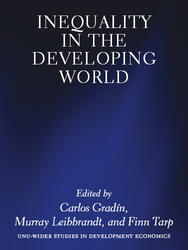Book
Inequality in the Developing World
Inequality has emerged as a key development challenge. It holds implications for economic growth and redistribution and translates into power asymmetries that can endanger human rights, create conflict, and embed social exclusion and chronic poverty. For these reasons, it underpins intense public and academic debates and has become a dominant policy concern within many countries and in all multilateral agencies. It is at the core of the 17 goals of the UN 2030 Agenda for Sustainable Development.
This book contributes to this important discussion by presenting assessments of the measurement and analysis of global inequality by leading inequality scholars, aligning these to comprehensive reviews of inequality trends in five of the world’s largest developing countries — Brazil, China, India, Mexico, South Africa. Each is a persistently high or newly high inequality context and, with the changing global inequality situation as context, country chapters investigate the main factors shaping their different inequality dynamics.
Particular attention is on how broader societal inequalities arising outside of the labour market have intersected with the rapidly changing labour market milieus of the last few decades. Collectively these chapters provide a nuanced discussion of key distributive phenomena like the high concentration of income among the most affluent people, gender inequalities and social mobility. Substantive tax and social benefit policies that each country implemented to mitigate these inequality dynamics are assessed in detail.
The book takes lessons from these contexts back into the global analysis of inequality and social mobility and the policies needed to address inequality.
 Join the network
Join the network